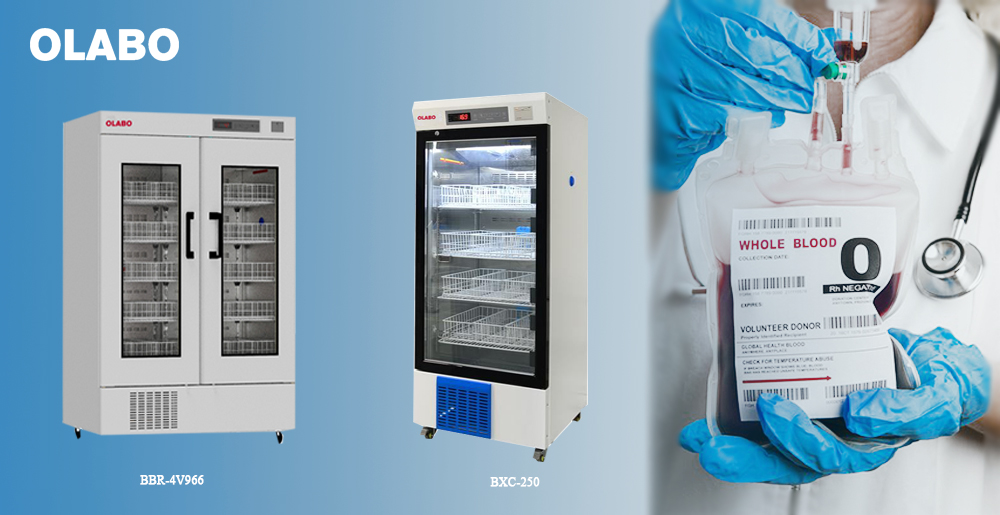Red cells must only be stored in designated Blood Bank Refrigerators.
Only staff trained by the Blood Transfusion Clinical Nurse Specialist may remove blood from the Blood Issue Room Fridge.
Blood must not be out of the designated temperature-controlled storage areas for more than 30 minutes.
Do not collect blood in advance if the patient has not been cannulated ready for transfusion.
Red cells
Blood is an excellent culture medium for bacterial growth; therefore it is stored in approved refrigerators at 2-6°C, where it has a shelf life of 35 days from donation. There are legal requirements for temperature regulation and alarm systems for storage of blood. The hospital has approved Blood Bank refrigerators located in the Blood Issue room in Pathology and in the store room in Theatres.
Blood must never be stored in domestic or other refrigerators. Blood should be removed, one unit at a time, from the Blood Bank refrigerator only when a transfusion is due to commence within 30 minutes. Transfusion must be completed within 4 hours of removing the pack from the Blood Bank refrigerator to avoid the risk of bacterial growth.
Bacterial contamination of blood products may be the single largest cause of death from transfusion accidents. If a unit of blood has been out of the refrigerator for more than 30 minutes and there is no prospect of its imminent transfusion, the Blood Bank must be informed and the unit marked as “Unsafe to Transfuse.” The unit is then to be brought directly to a member of staff in the Blood Bank for safe disposal.
Collection of the wrong blood from storage locations is one of the most common causes of serious transfusion accidents. Staff responsible for removing blood from approved Blood Bank refrigerators must carefully check the patient’s identification details against appropriate documentation.
Red cells will be available for collection in the Blood Issue room refrigerator.
Fresh Frozen Plasma (FFP)
Fresh frozen plasma is stored in approved freezers at less than -30°C. It is thawed just before use (a process which takes up to 30 minutes) and once thawed, must be infused within 24 hours if kept at 4°C (or 4 hours if kept at room temperature).
FFP will be available for collection in the Blood Issue room refrigerator.
Cryoprecipitate
Cryoprecipitate is stored in approved freezers at less than -30°C. It is thawed just before use (a process which takes up to 20 minutes) and once thawed, must be stored at room temperature and infused within 4 hours.
Cryoprecipitate will be available for collection in the Blood Transfusion laboratory.
Platelets
Stocks of platelets are not kept in the hospital Blood Bank but ordered from the National Blood Service (NBS) for specific patients as required. They are kept in the Blood Transfusion laboratory under special storage conditions which preserve their clinical effectiveness and have a shelf-life of only 5 days from donation because of the risk of bacterial contamination.
Platelets must NOT be refrigerated. They are issued as an adult or paediatric “therapeutic dose” and must be transfused immediately after collection from the Blood Issue Room. Rh Negative pre-menopausal women should receive Rh (D) Negative platelets whenever available.
Platelets will be available for collection in the Blood Transfusion laboratory.
Human Albumin Solution
Available as 4.5%(500mls) or 20%(50/100ml) solutions. HAS is normally stored at room temperature and in the dark (check individual product specifications). It must not be left on window sills or in direct sunlight. Each transfusion must be completed within 3 hours.
It is essential that all blood products can be traced to the patient receiving them – failure to complete documentation can have severe medico-legal consequences in the event of viral transmission or other adverse reactions.
HAS will be available for collection in the Blood Transfusion laboratory.
Anti-D Immunoglobulin
Available as 250 IU or 500 IU solutions. Anti-D immunoglobulin for Rh (D) prophylaxis is available from the Blood Transfusion laboratory for any Rh(D) Negative woman who has had a potentially sensitising episode, in accordance with current national guidelines. Prophylactic Anti-D must be administered within 72 hours of a sensitising event.
Anti-D is also available for prophylaxis of any sensitising event; 250 IU is given when less than 20 weeks’ gestation, 500 IU is given when greater than 20 weeks’ gestation provided that the feto-maternal haemorrhage (FMH) is less than 4mL. If the FMH is greater than 4mL, an appropriate dose is calculated by blood transfusion staff using the results from the Kleihauer test; and is issued by the Blood.
Click to know more:
OLABO China Blood Bank Refrigerator BBR-4V966
OLABO China 4 Degree 356L Blood Bank Refrigerator
Post time: Aug-17-2022

